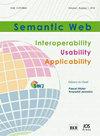INK:用于高效和高性能规则挖掘的知识图表示
IF 2.9
3区 计算机科学
Q2 COMPUTER SCIENCE, ARTIFICIAL INTELLIGENCE
引用次数: 1
摘要
语义规则挖掘可用于在知识图(KG)中派生与任务无关或特定于任务的信息。总结KG或预测未来事件的完全可解释二元分类器的底层逻辑推理是这种规则挖掘过程的常见结果。然而,当前用于执行任务不可知或特定于任务的语义规则挖掘的方法使用了完全不同的KG表示,这使得它们不太适合执行两个任务或合并彼此的优化。这也导致需要掌握在KG中探索和挖掘规则的多种技术,并且在将一种KG格式转换为另一种格式时浪费时间和资源。在本文中,我们使用基于邻居感兴趣节点的KG表示INK来挖掘规则以改进决策支持。通过选择一组或两组感兴趣的节点,在INK表示上创建的规则挖掘器将挖掘与任务无关或特定于任务的规则。在这两个子领域中,INK挖掘器在多个领域的14个不同基准数据集上与当前最先进的语义规则挖掘器竞争。本文章由计算机程序翻译,如有差异,请以英文原文为准。
INK: Knowledge graph representation for efficient and performant rule mining
Semantic rule mining can be used for both deriving task-agnostic or task-specific information within a Knowledge Graph (KG). Underlying logical inferences to summarise the KG or fully interpretable binary classifiers predicting future events are common results of such a rule mining process. The current methods to perform task-agnostic or task-specific semantic rule mining operate, however, a completely different KG representation, making them less suitable to perform both tasks or incorporate each other’s optimizations. This also results in the need to master multiple techniques for both exploring and mining rules within KGs, as well losing time and resources when converting one KG format into another. In this paper, we use INK, a KG representation based on neighbourhood nodes of interest to mine rules for improved decision support. By selecting one or two sets of nodes of interest, the rule miner created on top of the INK representation will either mine task-agnostic or task-specific rules. In both subfields, the INK miner is competitive to the currently state-of-the-art semantic rule miners on 14 different benchmark datasets within multiple domains.
求助全文
通过发布文献求助,成功后即可免费获取论文全文。
去求助
来源期刊

Semantic Web
COMPUTER SCIENCE, ARTIFICIAL INTELLIGENCEC-COMPUTER SCIENCE, INFORMATION SYSTEMS
CiteScore
8.30
自引率
6.70%
发文量
68
期刊介绍:
The journal Semantic Web – Interoperability, Usability, Applicability brings together researchers from various fields which share the vision and need for more effective and meaningful ways to share information across agents and services on the future internet and elsewhere. As such, Semantic Web technologies shall support the seamless integration of data, on-the-fly composition and interoperation of Web services, as well as more intuitive search engines. The semantics – or meaning – of information, however, cannot be defined without a context, which makes personalization, trust, and provenance core topics for Semantic Web research. New retrieval paradigms, user interfaces, and visualization techniques have to unleash the power of the Semantic Web and at the same time hide its complexity from the user. Based on this vision, the journal welcomes contributions ranging from theoretical and foundational research over methods and tools to descriptions of concrete ontologies and applications in all areas. We especially welcome papers which add a social, spatial, and temporal dimension to Semantic Web research, as well as application-oriented papers making use of formal semantics.
 求助内容:
求助内容: 应助结果提醒方式:
应助结果提醒方式:


